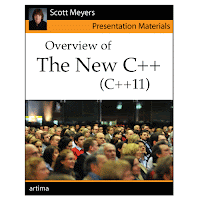My normal practice is to publish a changelog along with each new version of the materials, but in this case, I added and removed pages in a number of places, and trying to keep track of and figure out how to describe what got changed where became burdensome, so I stopped trying. As a result, there is no detailed changelog, but I can offer this high level list of changes:
- Coverage of
enum classes has been added. - Coverage of the interaction between
noexceptand move operations in the STL has been added. - Coverage of universal references has been added, and the example of using them for constructors has been removed. (This blog post explains why I now think it's generally inappropriate to use universal references for constructors.)
- Coverage of numeric-string conversion functions has been added.
- Coverage of alignment control (
alignof,alignas,std::aligned_storage, andstd::aligned_union) has been added. - Coverage of implementation of
std::get(forstd::tuple) has been added. - Coverage of braced initializers has been extended.
- Coverage of lambdas has been extended.
- Bugs have been fixed, explanations have been improved, and information has been updated in a number of places.
Books on C++11 are beginning to come out, but they're, well, long. For example, the latest C++ Primer is 976 pages, and the upcoming C++ Programming Language is listed at 1040 pages. If you're looking for more of a technical overview of C++11's primary features than a comprehensive treatment of essentially everything, I think my training materials (383 slides in 22-point type, plus accompanying notes) is a choice you should consider.
As before, you can download a free sample to see exactly what you'd be getting if you bought the materials. Topics covered in the free sample include:
- Copying versus moving (high-level overview).
- Simple example program: C++98 versus C++11.
- "
>>" to close nested templates. autofor type declarations.- Range-based
forloops. nullptr.enum classes.- Unicode support.
- Raw string literals.
If you're interested in a book-like publication covering the most important parts of C++11 (both language and library), I encourage you to consider purchasing my training materials. If you like my other publications, I think you'll like these, too. To see exactly what you'll be getting, check out the free sample.Thanks,
Because this publication is in an unconventional format (annotated training materials), is available from a lesser-known publisher (Artima), and is electronic-only (DRM-free PDF), getting the word out about it has been challenging. I'd appreciate it if you'd let people know about it, whether through blogs, tweets, social networks, email, or that most retro of communications mechanisms, face-to-face conversation.
Scott

I noticed Artima is also selling the slides from C++ and Beyond 2010. Will the slides from C++ and Beyond 2011 and 2012 also be put up there? If so, any estimates when?
ReplyDelete@Anonymous: We decided not to sell the slides for C&B 2011 or 2012, but several of the presentations have been made or will be made available on Channel 9. When such talks are posted, we make an announcement on the C&B blog.
ReplyDeleteScott
Alas. Oh well. I suppose I shouldn't get too greedy.
ReplyDeleteThanks for making the 2010 slides and all your other training materials available for purchase. They're much appreciated.
Thanks for the update! I noticed a small error on slide 177: using enum class labels as template argument for std::get won't not work because they are not implicitly convertible to int. So one either needs to use old enums, or one needs to insert a static_cast inside std::get. See also this Stackoverflow question.
ReplyDelete@Rein Halbersma: Thanks for pointing this out. Normally I test all my code before publishing it, but in this particular case, I forgot to do that, and boy, is my face red. I've already fixed this bug in the master copy of the materials.
ReplyDeleteThis comment has been removed by a blog administrator.
ReplyDelete